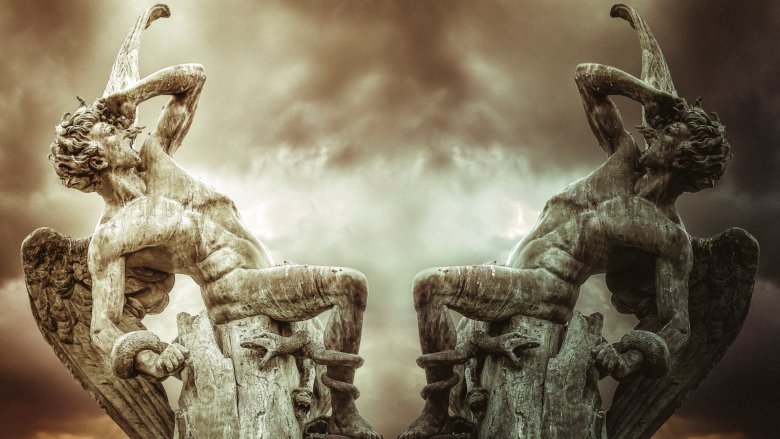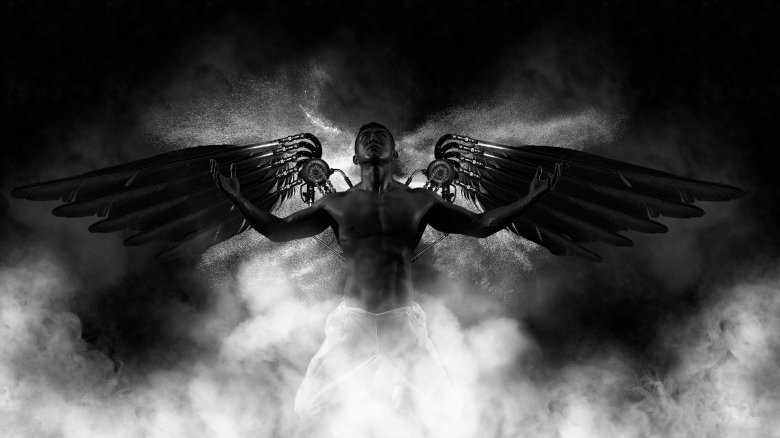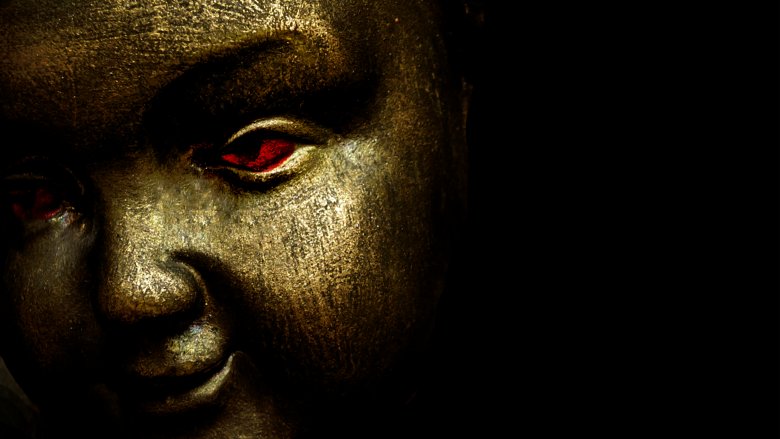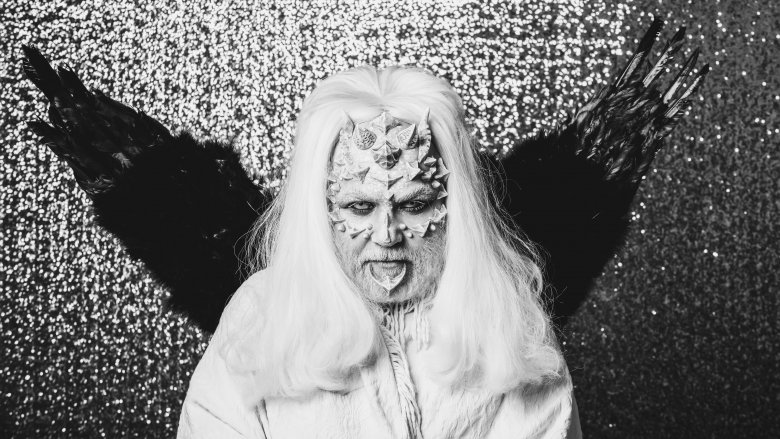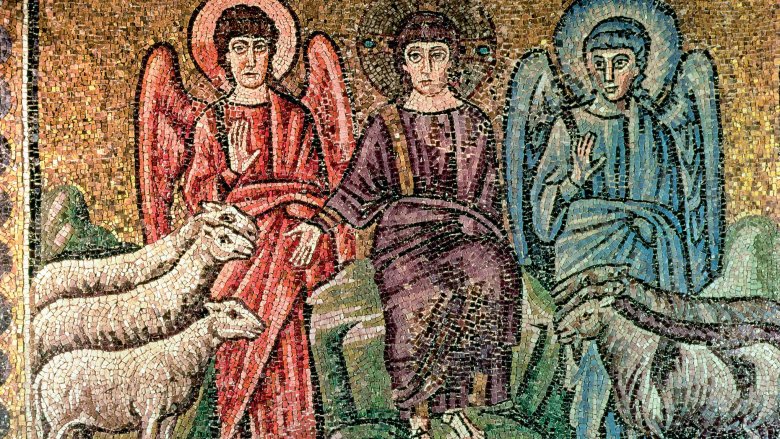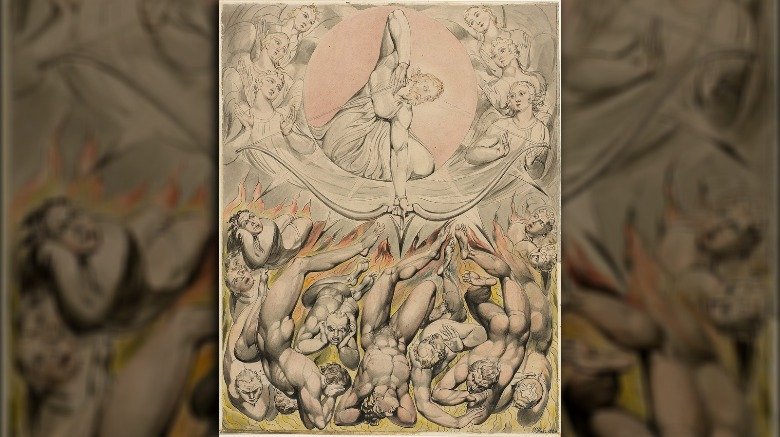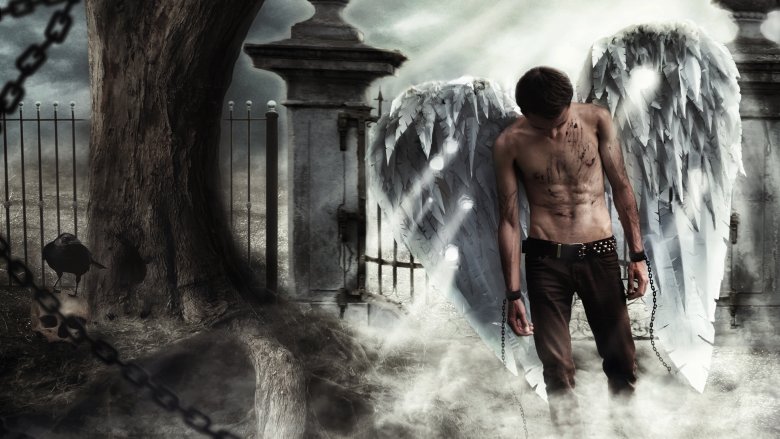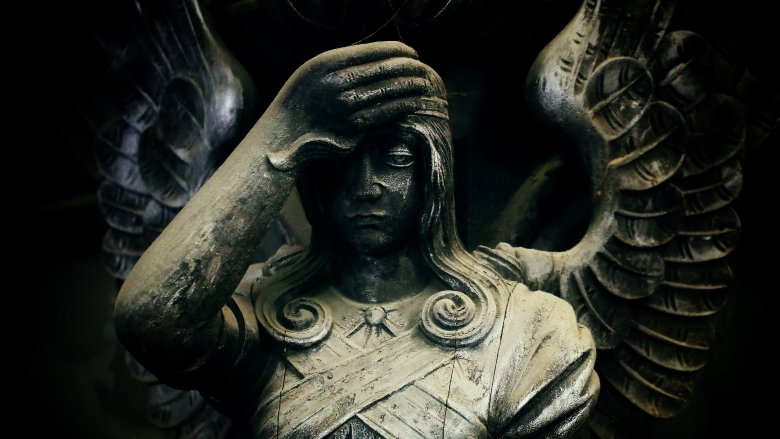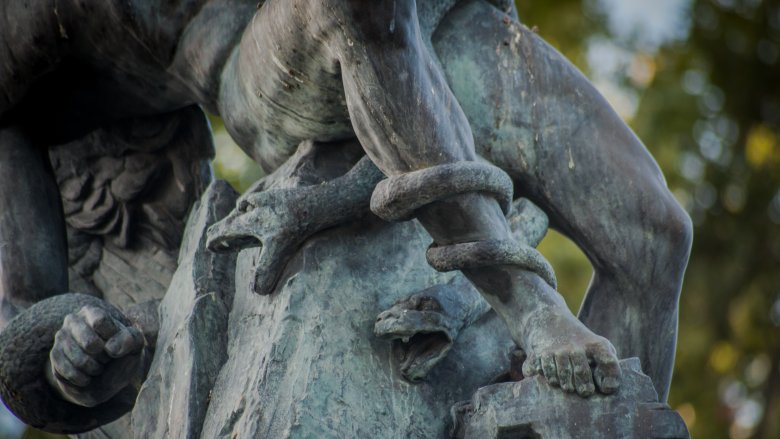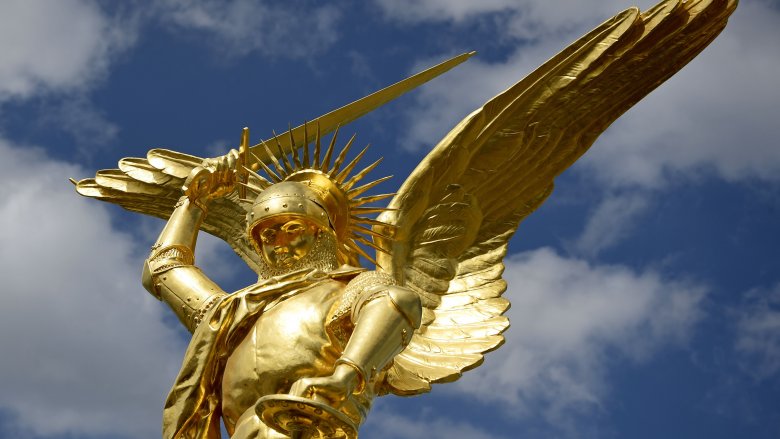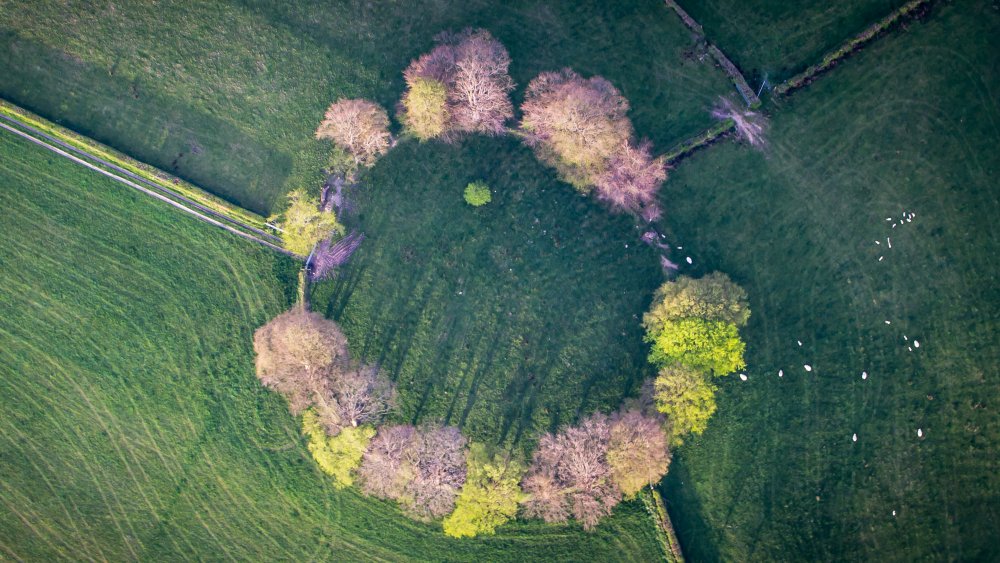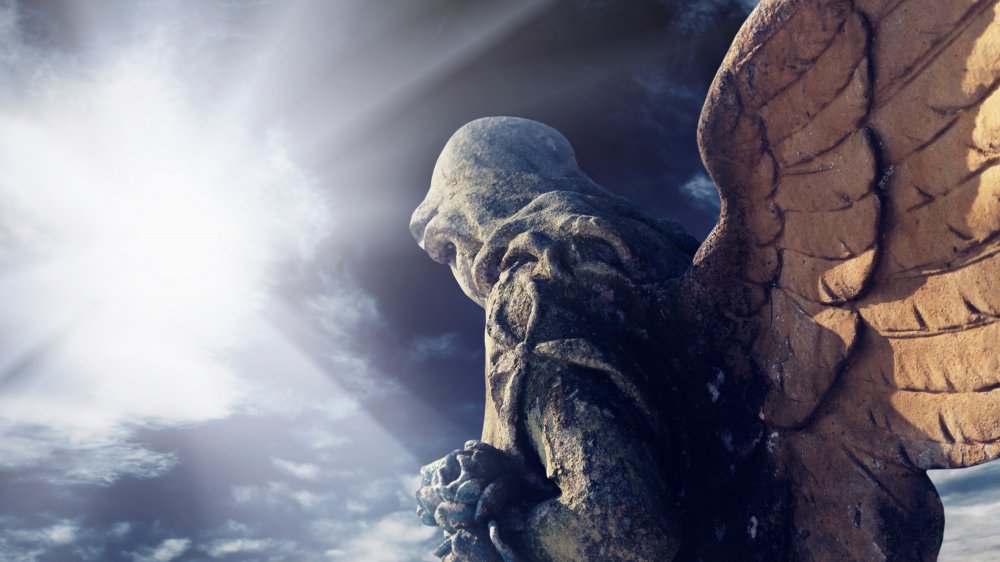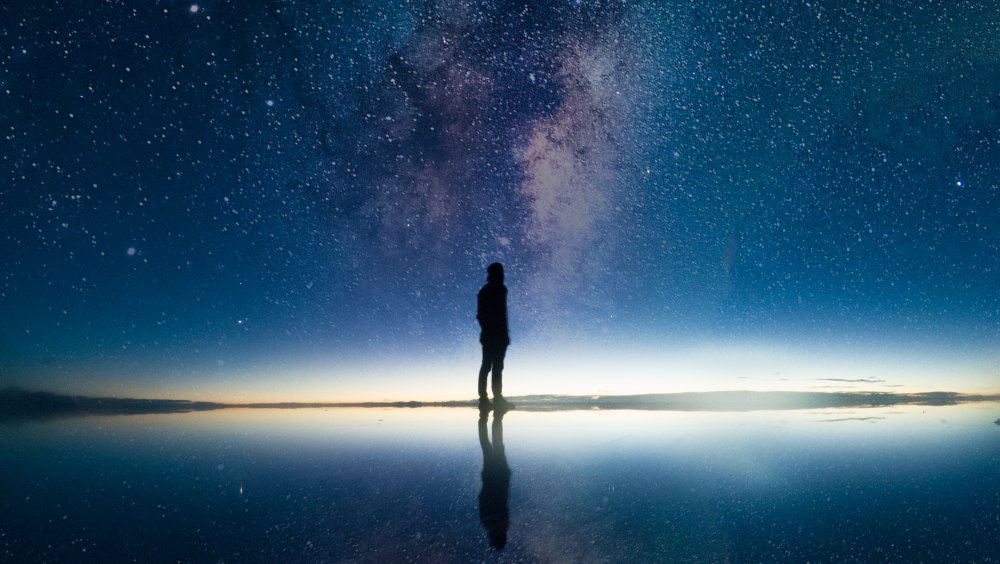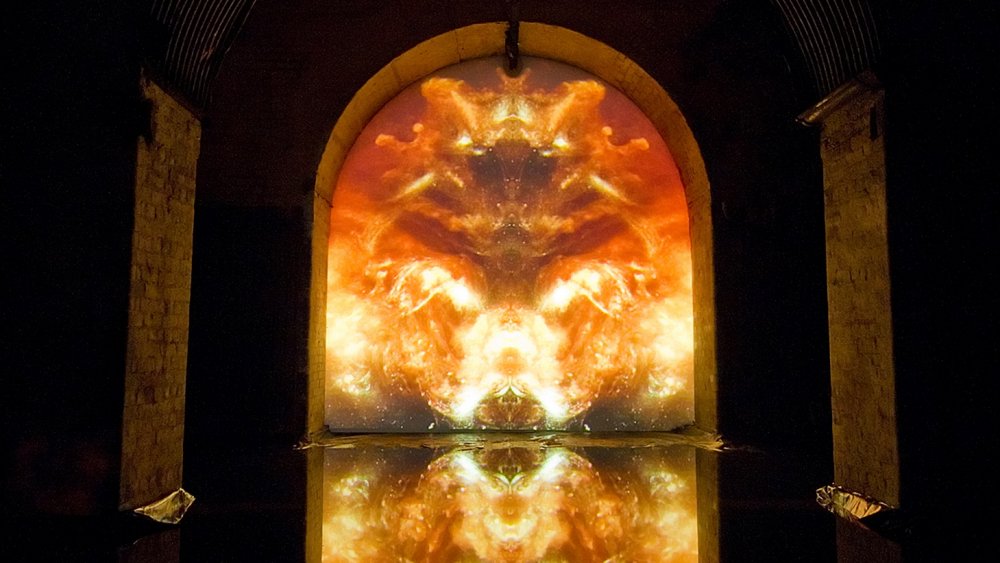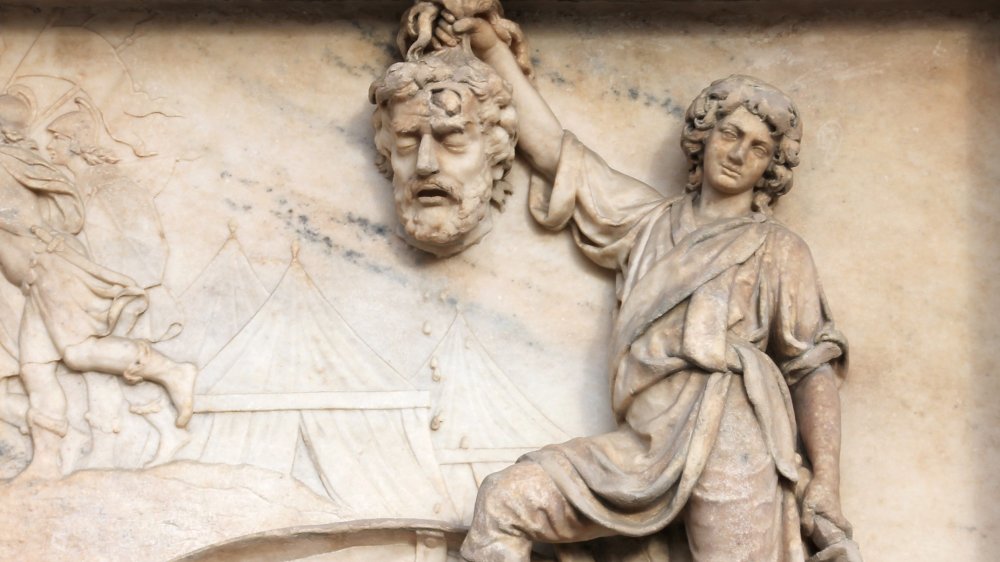The Untold Truth Of Fallen Angels
First, a bit of a disclaimer: Religion is as complicated as the people who follow it. Taking on even a small section of theology is a massive undertaking, and honestly, it's just a mess of different versions of all kinds of stories and beliefs. So that being said, let's talk about some of the bad boys of several religions: fallen angels.
Everyone knows what angels are — wings, halos, all kinds of bright light and grace. Fallen angels started out not-so-different at all, and there's a lesson to be learned there. The first — and often, the only — fallen angel most people think of is the Christian version of Lucifer, who took on God, fell from heaven, and went on to run a nightclub and consult with the LAPD.
But he's definitely not the only one, and different religious traditions even have their own and very different pantheons of fallen angels. They're a fascinating glimpse into what mere mortals fear most, and looking at just who fallen angels are and what they do tells just us just as much about ourselves as it does about them.
What makes a fallen angel, well, fallen?
So here's where things get complicated. Fallen angels are basically angels that have given up on the good and righteous path and turned to evil, everyone knows that, right? But in some religions, there's more to the story. According to Whitney Hopler of George Mason University's Center for the Advancement of Well-Being, the Jewish and Christian traditions believe that fallen angels were originally just as holy as any of the other angels, but fell when the most beautiful of them all — Lucifer — decided to rebel and enticed others to go with him. The rebellion and their loss to Michael and his angelic army turned them evil, and a lot of them — about a third of all angels — fell with Lucifer.
In Hindu traditions, it's a little different. They believe that the creator god, Brahma, actually made some angelic beings good and some evil from the very beginning. Why? Because it's meant to illustrate the natural order of things, and balance in the universe.
And fallen angels don't exist in Islam, where traditions say that all angels are good — including the ones tasked with overseeing those whose evil souls who have landed them in hell. They're lording over hell, yes, but they're still doing divine work. There's another explanation for Satan there, too, and it basically says he's not an angel, he's a jinn: a creature made from fire and free will.
Where most of our knowledge of fallen angels comes from
Whitney Hopler of George Mason University's Center for the Advancement of Well-Being says those who believe in fallen angels typically believe them to be responsible for things like tempting mortals into sin. And they're tricky about it, too, sometimes masquerading as good angels as they torment and tempt.
How do we know all this? A lot of our knowledge of fallen angels comes from the non-canonical Book of Enoch, which was written about 350 B.C. and was found with the Dead Sea Scrolls. It's pretty heavy stuff, too, according to the Biblical Archaeology Society Library. The texts claim to be the revelations of Enoch, who was taken up to heaven and told the universe's deepest secrets, then shown just what would happen during mankind's ultimate judgment.
Enoch shows up in other texts, and according to the Gnostic Society Library, there are a ton of stories about him. He lived to be 365 years old, eventually telling his tales to his son, Methuselah, who achieved an impressive 969 years on Earth. Strangely, even though the stories of Enoch were influenced by the mythology of places like Babylon and, in turn, influenced Judaism and Christianity, the only place that all 100 chapters of the book survived was Ethiopia. Among those chapters was a fascinating explanation of fallen angels.
Lust destroyed the angels of the Book of Enoch
One of the most widely told tales of fallen angels says it was Lucifer who rebelled against God and brought a bunch of angels down with him, but the story told in the Book of Enoch is very, very different.
According to the Gnostic Society Library, the Book of Enoch tells the tale of angels who are destroyed by lust. (The story also shows up in Genesis, but in less detail.) Before the Great Flood, angels and humans met and mingled pretty commonly, and the inevitable happened: children. Those children were the sons and daughters of 200 angels, and they were a race of 450-foot-tall giants. The angels started teaching their giant offspring evil ways, and God not only imprisoned them, but subjected them to judgment and sent the flood to hit the reset button on his creations. (It's also worth noting that Les Enluminures says Noah is the great-grandson of Enoch.)
Enoch, the story says, tried to speak on behalf of the angels and their giant children — but sadly, a lot of the texts are missing. We do know that Enoch was the one God selected to act as an intermediary to the fallen angels, instructing him to tell them what their punishment would be for their transgressions. They were to be condemned to the ends of the earth, and punishment was definitely going to be a big part of their version of eternity.
Fallen angels were disobedient to God in other traditions
According to Les Enluminures, Enoch was considered a prophet to early Jewish writers. When Christianity started to adopt his teachings, he largely fell out of favor with Judaism. Christian writers took the Book of Enoch with them when they converted the rather isolated areas of Ethiopia in the fourth and fifth centuries, preserving the text there, where it stayed before being brought to Europe in 1773. Meanwhile, Christian scholars and writers were doing some serious interpreting of the version of the Bible approved by the church, and the thing is, it's never said that Satan is a fallen angel.
How he became one is a bit of tricky logic, says Live Science. The reasoning went like this: God created everything in the universe, and therefore, God created Satan. But the only things God creates are good things, so therefore, Satan must have been good at one point. He needed to have the free will to turn bad, so he became a fallen angel.
To get technical about it, the first Biblical character given the moniker "lucifer" wasn't a fallen angel at all — it was Jesus. He was called "Lucifer" in an old translation of the Bible, and the name was only later applied to the world's least favorite fallen angel when, in Luke 10:18, Jesus said, "I have observed Satan fall like lightning from the sky" (via Franciscan Media).
The first of the fallen angels
According to the Book of Enoch, each one of the first of the fallen angels was responsible for teaching mankind something that led them to sin. Take Asbeel. He's the one who gave the evilest of counsel to the "holy sons of God," and introduced them to the wonders — and basest evils — that came with hooking up with women. Kasdeja was the one who brought mankind knowledge about spirits and demons, and who showed them "the smitings of the embryo in the womb" and "the smitings which befall through the noontide heat."
The creation of a race of giants (half-angels, half-human) was said to have been the work of one angel in particular: the leader of the fallen, Shernihaza (via the Gnostic Society Library). Other sources cite variations of the name, like Samjaza, but he was the one that led to the ultimate imprisonment of the fallen and the end of the world with the Flood. The Book of Giants tells the story of some of his children — like Ohya and Hahya — but sadly, much of the manuscript has been lost.
Perhaps the strangest of all was Penemue, the fallen angel credited with giving mankind something that led to all kinds of evil: the written language. With writing came the knowledge of destruction, and writing was supposedly responsible for widespread death and descent into darkness.
The one you know? That's Gadreel
There's one fallen angel in particular that warrants talking about on his own, and that's Gadreel. According to the Book of Enoch, Gadreel was responsible for a lot of trouble on his own and even though most might not recognize his name, they're familiar with his work. He's the one who's credited with enticing Eve with the forbidden fruit and leading otherwise unsuspecting, holy humans down the path of sin in the first place. He's also the one who gave mankind "all the weapons of death," along with shields and armor, and he first showed people how to kill each other.
That's completely different than the picture many have about just what went down in the Garden of Eden, an act of temptation that's usually credited to Satan in the guise of a snake. But according to the Biblical Archaeology Society, that absolutely wasn't on anyone's mind when it was first written, mostly because at the time there was no concept of the devil as we think of him today. Personification of the snake started with Enoch and Gadreel, but it took a few centuries before the fallen angel morphed into one much more well-known.
Fallen angels originally looked quite different
Quick, describe a fallen angel. There are probably some scowly faces, bat-like wings, maybe even some horns or cloven hooves. But National Geographic says it wasn't always like that. In early Christian art, fallen angels looked pretty much the same as their holier counterparts. One of the earliest representations of the idea that there were angels and fallen angels opposing each other in an otherworldly battle is featured in a mosaic (above) in the Basilica of Sant' Apollinare Nuovo in Ravenna, Italy. Jesus is in the middle, and on one side are an angel in red with some sheep. The sheep are the faithful, and red was originally used to depict the holy kingdom. (It didn't become associated with brimstone and hellfire until later.)
On the other side is a figure thought to be Lucifer or Satan, but he doesn't look very Satanic. He stands next to goats instead of sheep, and he's wearing blue, which was the color of the damned. The mosaic also suggests fallen angels kept their iconic halos, which were a symbol of power, not holiness.
According to the British Library, this image of fallen angels started to morph into something much more grotesque in the Middle Ages, and they were designed to be an evil interpretation of a traditionally angelic form. Still, fallen angels retained the ability to disguise their true form, and that's extremely creepy.
Our ideas about fallen angels were largely created by fiction writers
If fallen angels started out looking like, well, angels, why do we think of them as horrible, twisted, demonic creatures? The answer, says National Geographic, involved John Milton's Paradise Lost and his depiction of Lucifer. But it's more complicated than that. Milton — who was writing in the 17th century — tapped into what was essentially a pop culture depiction of a fallen angel who wasn't described in the Bible at all.
Throughout the Middle Ages, a strange thing started to happen. Creatures from ancient Babylonian texts — called Lilitu — started to take on a new life as these winged seductresses became associated with Adam's first wife, Lilith. At the same time, parallels were drawn between Satan and the ancient Canaanite deity Beelzebub, and the ancient Roman half-goat, half-man god of nature, Pan.
Then, in the 14th century, Dante described Satan as lording over the deepest depths of hell, and gave him his bat wings. Milton hopped on board a bit later — when Satan had been transformed from a passive adversary into an active evil — and wrote the descriptions of the fallen angels that we now think of today, existing in "Adamantine Chains and penal Fire." (Above, Milton's fallen angels are illustrated getting totally wrecked in battle.)
Fallen angels were a huge problem for theologists
The existence of fallen angels has presented theologians with some serious problems; namely, how could they even exist? Since God created everything, that also meant God had created something evil or with the capacity to be evil, and that just wasn't going to fly with most Christian scholars. The implications of that were terrifying, so there had to be another explanation.
Until the 12th century, "pride" was the typical answer as to why fallen angels fell. But that meant God would have had to create something with a crippling, all-powerful amount of pride, and that didn't fly. So scholars came up with the idea that angels had been created with a natural love that allowed them to love God, themselves, and each other. Part of that love was involuntary, and another part was voluntary. That voluntary love was further divided into the idea of friendship and the idea that some love exists because it makes someone happy.
It was further argued that angels' love of God was the involuntary kind, and all was fine. Until, that is, one angel realized that he loved God because God made him powerful, and that made it voluntary. Once that angel — Lucifer — realized how nice it was to love and be loved for selfish pleasure instead of simply for love's sake, well, that's when all the problems started.
After Lucifer, the other angels fell because they were lonely
The idea that Lucifer kicked off the fall of the angels because he started experiencing love for a selfish reason is all well and good, and it kind of makes sense. It's another side to the pride coin, but a twisted, dark, selfish love ... that's something most people can understand. That may have made it possible for that Lucifer to fall, but what about the other angels that went with him?
That presented another theological problem because other angels just weren't on the same level as Lucifer, God's most beautiful creation. Scholars thought it was a little unbelievable that lesser angels could possibly love in the same way, so what's up with that? The explanation is actually pretty heartbreaking.
The theory developed by thinkers of the Middle Ages says those angels fell not because they hated God but because they loved Lucifer. God was largely an absent, distant figure, after all, and Lucifer was their friend. Rather than condemning themselves to struggle for the acceptance of an unreachable father, perhaps they followed their brother into exile.
Fallen angels' lack of lust for men was used to condemn anyone who was gay
Religion impacts the material, human world in strange ways, and one of those ways, says scholars from the Mirabilia Journal, is that the idea of fallen angels impacted just how homophobic the world was for a long time. Scholars have long debated about whether fallen angels and demons are capable of love, and some described it not as a love like most know it, but as a desire for other creatures as a sort of stepping stone in the creation of their own evil ends.
Since Christian writers as far back as Paul warn women of attracting the lusty gazes of fallen angels, it's safe to say they believed there was something going on there. But it's not so much love as it is lust, and the male demons and fallen angels seem to only have these affections for women. Early scholars declared that since not even fallen angels would lust after their own sex, there was something very fundamentally wrong with humans who did that. The role of fallen angels is to tempt in the most horrible and basest of ways, and even they wouldn't tempt other men. Cue centuries of persecution.
Other angels are tasked specifically with punishing fallen angels
If you think about it — really, really think about it — there's nothing in our contemporary version of things that suggests there's really any kind of punishment for the fallen angels that joined Lucifer from his descent from the heavens. Sure, there's a hell, but they're not exactly at the mercy of all the demons there ... they are the demons. Right?
Not quite. According to the Jewish Virtual Library, the seven archangels counted the punishing of the fallen angels among their heavenly duties. Each one of the archangels was in charge of particular facets of the otherworldly life: Jeremiel, for example, keeps watch over the souls in the underworld, while Michael protects Israel, Gabriel is the overseer of Paradise, and Uriel leads the host. They're the ones with direct access to God, and they're also in charge of punishing the fallen.
Punish how? Take Azazel, who was the one who taught mankind how to make weapons. According to the Watkins Dictionary of Angels, he was punished by Raphael, who put him in chains, threw him in a pit full of sharp rocks in the middle of the desert, and brought the darkness down on him while he waited for his condemnation after the final judgment. Sounds like a grand ol' time.
Birds of paradise were once thought to be fallen angels
Birds of paradise are a species from New Guinea and the nearby islands, and they're so breathtakingly beautiful, they don't look real. But beauty in the animal world comes with a devastating price — National Geographic says their feathers were so prized that hunters nearly drove them to extinction. When those birds were first seen by European eyes, they were already dead and dried, with legs and wings removed. The Public Domain Review says it wasn't until the 16th and 17th centuries that explorers and traders brought the birds to Europe, so unsurprisingly, people had a tough time trying to decide just what these lifeless things were.
They had no doubts that they were something special: the earliest arrived in 1522, and were said to have come from a "terrestrial Paradise" and, in spite of the feathers, they supposedly never flew. It's no wonder that it didn't take long before the birds were described as angels — fallen angels that had lost their ability to fly, and instead lived in the magical, mystical world that was the Far East. They became mythologized in religious texts, works of art, and allegories as beautiful, ethereal beings who had clearly done something terrible to lose their wings.
In the early 17th century, naturalists got a hold of other birds, ones with their wings and legs intact. The fallen angel mythology faded a bit, but they've long remained a symbol of the flightless fallen.
The fairies of Irish mythology were actually fallen angels
Few modern-day cultures are as closely tied to their ancient traditions as Ireland, and consequently, everyone's familiar with the idea of the fairies and the fae folk that have inhabited the Emerald Isle since time began. But Irish fairies aren't of the typical flowers-and-glitter sort — and one of the theories as to where they came from is that they were originally fallen angels. W.B. Yeats cataloged old Irish beliefs in Fairy and Folk Tales of the Irish Peasantry, and he wrote of the fairies: "Who are they? 'Fallen angels who were not good enough to be saved, nor bad enough to be lost,' say the peasantry."
Legends say that these particular fallen angels were less guilty than the ones that actively opposed God, and were sentenced to an eternity in the most remote places on earth: some were cast into the ocean and became merfolk, some went underground to become goblins and trolls, while others were sent to the harshest areas of the countryside, and became leprechauns (via Texas State University).
The other theory of fairy origin is that they were once ancient heroes and deities who ceased to be worshiped and began to fade into creatures of lesser power, but Yeats says there's a lot of support for the idea that fairies could trace their lineage back to fallen angels. Most telling of all was their behavior: they were always said to be good and kind to those who were good to them, but would unleash hell on earth to those who were evil or disrespectful.
Why have they always been so important?
Fallen angels are something of a consistent, running theme throughout numerous religions, which brings up a question: why have we so regularly told stories of them, and why have we been so fascinated with them? Dr. Miryam Brand of the WF Albright Institute of Archaeological Research in Jerusalem attempted to answer that question (via The Torah), and says there's a few things at work. First, they give us an answer to why we sin, and why human evil exists. It's not our fault, not entirely, at least, but it's the fault of the fallen angels we were corrupted by. And it's nice to have a scapegoat.
They also explained why mankind continues to sin — because we're still being tempted by them — and at the same time, they present us with something surprising: hope. If sin and evil is the cause of the fallen angels, when the ultimate battle between good and evil comes, there's going to be a redemption. Everyone loves a good redemption story.
And, there's just one more thing. The presence of these angels gives God an out because now, He's not the one that's behind sin and temptation, disease, hate, or any of the other approximately one million evils present in the world. It's those pesky fallen angels, and having them take a prominent place in religious beliefs means people have someone besides God to blame for all that's bad.
How fallen angels condemned mankind by showing them their beauty
Ever start to think that it's mankind's vanity and sense of self-importance that's going to be the end of us? That's not a new thought and in fact, one of the first things fallen angels taught us to kick-start our own fall from grace was vanity.
Originally, New Dawn Magazine notes, it was said that there were 200 fallen angels that headed to earth to cause some serious havoc. At their head was an angel called Lucifer, Azazel, or Lumiel, and he's the one that taught men how to make armor so that, you know, it took a little more effort to kill each other. But he taught the women something too: how to use cosmetics and specifically kohl, a black eye product popular since ancient times. He also introduced them to the idea of jewelry like bracelets and rings, and how to use their finery and their feminine wiles to seduce men.
And this, says Dr. Miryam Brand of the WF Albright Institute of Archaeological Research in Jerusalem (via The Torah), was considered forbidden knowledge that started mankind on the road to corruption. It's also the reason for an age-old practice in numerous religions: the tradition that women needed to cover themselves, lest they tempt the men around them. Even St. Paul was a huge supporter of the idea that women needed to cover their hair, and we can all thank fallen angels for that one, too.
The eternal punishment of one fallen angel
Surely, fallen angels will have to pay for all this trouble they've caused mankind... right? There's one fascinating tale that says at least one already has — and we see him all the time.
Shemyaza is another name given to the leader of the fallen angels, although researcher Andrew Collins notes that at some point before the Book of Enoch, Shemyaza and Azazel (or Lucifer) became two different angels. At any rate, it was Shemyaza who taught men the art of magic, and along the way, he also meets a mortal woman named Ishtar. The story varies in the telling — sometimes, it's said Ishtar was already a Babylonian deity when he fell in love with her (via New Dawn Magazine) — but either way, she promised him a little bedroom action if he would just let her in on one little secret: God's true and hidden name. (Other versions, according to The Manitoban, say that she pestered him until he let her try on his wings.) He, of course, caves to her demands and she uses her newfound knowledge — sometimes she uses it to ascend into the heavens, sometimes she uses it to turn from a mortal woman into a deity.
Whatever the details are, Shemyaza pays the same price: he's sentenced to hang for an eternity, upside-down, among the stars. He's still there, as a constellation in the night sky, although we more commonly call him Orion.
The fallen angels that sort of accidentally fell
Take a deep dive into the various religions of the world, and you'll find they have a lot in common — and as Harvard notes, Christian, Jewish, and Islamic texts all feature the story of twin angels who fell and were punished for eternity.
Take Harut and Marut, fallen angels Britannica describes as "unwittingly" becoming evil. Their story is a little different than that of, say, Lucifer, as they didn't consciously decide, "Hey, the heck with Heaven, this evil stuff seems pretty fun." Instead, they were part of a group of angels who laughed at mankind for their apparent inability to resist sin and temptation. God overheard it and, declaring that angels would fare no better in the face of the same temptation, selected Harut and Marut to go to Earth and try to resist. They absolutely couldn't: They were immediately seduced by a human woman and then killed the man who'd seen them with her. Harut and Marut were forced to admit that they'd been wrong, and they were allowed to choose their punishment.
The story says that they're trapped on Earth until Judgement Day — in Jewish sources, they're confined to the Mountains of Darkness (along with the Ten Lost Tribes of Israel, and Gog and Magog), trapped behind a barrier put up by Alexander the Great. Still, humans occasionally visit them in search of knowledge: It's said they gave Genun the Canaanite musical instruments, beer, and iron weapons, although most of the people who go to see them are looking to learn magic.
The belief that God and fallen angels are working together
Fallen angels are usually rebelling against God, right? But here's the weird thing — according to Founding Gods, Inventing Nations, that's not always the case: Sometimes, they fell with God's permission.
Qur'anic texts suggest that God and the fallen angels are essentially in cahoots, working to prove which humans are good and which are evil. And it started way back with Iblis: When God casts him down, he asks for permission to lure humans away with the promises of evil and sin. God 100-percent gives it — Iblis is the one that's ultimately also known as Satan, and in spite of the fact that Iblis is full of constant mockery and backtalk, he's only allowed to do what he does because God says it's okay.
And he does a lot — even convincing mankind that the worship of idols is a good idea is all his doing ... still with God's permission. Other fallen angels — like Harut and Marut — pass on knowledge of magic and gifts that promote sinful behavior to mankind, but they, too, are doing so with God's leave. What's in it for God? It's a handy way to separate the true believers and the faithful from the wicked and sinful.
The fallen angels ... according to Dante
Dante's view of the world we're all destined for is nothing short of terrifying ... if you're a sinner, at least.
As Dante is escorted deeper and deeper into the circles of Hell by his guide, Virgil, he sees the punishments that await sinners of all kinds. And the fallen angels are there, too — they're guarding the walls of the City of Dis. They slam the gates shut on Dante and his guide, and that's about the time that the Furies and Medusa show up to cause some more chaos. Virgil assures Dante that an angel — a real, heavenly sort of angel — is going to come and open the way for them, and one does. Clearly, he's the one in charge here: He opens the gate and reproaches the fallen, reminding them what happens when someone steps out of line.
Dante and Virgil pass and get to see what the angels were guarding. The city beyond is the sixth circle, and immediately beyond the gates guarded by the fallen angels are the heretics. They're the leaders of cults and their followers, and their punishment is an eternity confined to tombs engulfed in flames, heated red-hot. Further on are other groups of sinners, including the violent and fraudsters (flatterers, false prophets, alchemists, and the like).
One of the most famous descendants of the fallen angels: Goliath
When it comes to Bible stories, the tale of David and Goliath is one of the most famous, the story of an underdog coming out on top in spite of facing insurmountable odds. Those odds get even steeper if you subscribe to the theory that Goliath is a giant because he's descended from the fallen angels.
It's compelling stuff, and it starts with the Nephilim. According to Answers in Genesis, when angels fell, they hooked up with mortal women, who gave birth to a race of giants called the Nephilim. (As a side note, it's worth mentioning that this is just one theory acknowledged as having Biblical support — when it comes to Biblical tales, there's always more than one version.)
The Nephilim then, in turn, bred as well and split into different lines. One of those lines was the Anakim, a group of giants living in Canaan during the Exodus. Hold that thought, and let's jump over to Goliath. Goliath, Joshua tells us, was from a place called Gath, and Gath was one of three places where the Anakim lived. Given his stature and his hometown, scholars say it's entirely possible that he could trace his lineage back to the fallen angels. Mentions of other giants in the Bible can also be interpreted as supporting the idea that they were born of the Anakim, who were, in turn, part of the Nephilim.
